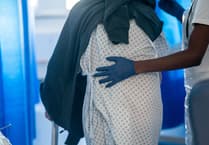THE NHS system critical incident declared on Friday evening continues, as health and care services continue to be busy due to winter bugs including flu that are impacting on patients and staff. Over the last month there have been almost four times as many hospital inpatients with flu compared to a year ago.
Local residents are being asked to make use of their local pharmacy, GP practice and minor injury unit services for minor illness or injury so that hospitals can be kept available for those who need it the most.
More 800 extra appointments have been made available at local GP practices to absorb demand. People with a friend or family member ready to leave hospital can speak to ward staff about the range of support available, including one-off grants to cover additional costs personal care or equipment that could help a patient leave hospital sooner.
Anyone with symptoms of an infectious illness such as flu, Covid-19 or norovirus is urged to stay at home, have plenty of rest and hot drinks and to use over-the-counter medicines to ease their symptoms. Regular hand washing can also help prevent the spread of winter bugs.
A system critical incident is called when health and care services are so busy that special measures are needed to restore normal operations and to keep people safe. These include opening more beds, arranging for extra staff to come into work, reducing non-clinical activities such as standing down meetings, and getting additional support from other services.
The system critical incident was called on Friday due to continued pressure on Cornwall’s health and care services, particularly the hospital and emergency department at the Royal Cornwall Hospital in Truro.
Dr Chris Reid, chief medical officer for NHS Cornwall and the Isles of Scilly Integrated Care Board said: "Over the last month we have seen almost four times as many hospital inpatients with flu as we did a year ago. Calling a system critical incident allows us to stand down non-urgent work and focus on seeing more patients in our primary care hubs, getting people home from hospital and helping keep them from needing to be admitted.”




Comments
This article has no comments yet. Be the first to leave a comment.